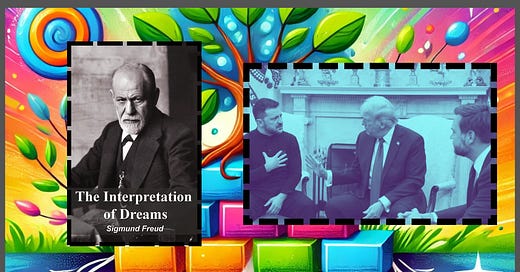As we know, world politics shifted dramatically when Trump and Vance ambushed Zelensky, followed weeks later by Trump using his congressional address to challenge Democrats. Today's New York Times headline declares that "Europe in Emotional Shock Grapples with a New Era" because Trump has "handed Moscow the gift that eluded it during the Cold War," leaving Europe feeling "jilted." The assessment suggests the US has "turned on its ally" and "embraced a brutal autocrat" in Putin, raising serious concerns about whether Trump's actions have emboldened Putin regarding Eastern Europe. I recommend the public philosopher Vlad Vexler for a thoughtful analysis. Trump appears to push for peace terms that pressure Zelensky rather than Putin to compromise at the negotiating table.
These developments explain why I—at 65 years old and as a healer, author, and activist committed to democratic values—am returning to academic studies at a psychoanalytic institute focused on global issues. A century after Freud's "Introductory Lectures on Psycho-Analysis,"1 our society has largely overlooked his political insights.
Whatever your opinion of Freud might be—and truly understanding him requires reading his works directly (I recently listened to Civilization and Its Discontents while traveling to an astrology conference)—his core insight extends beyond the existence of the unconscious to what he termed the resisted unconscious. We actively fight against and refuse to confront our unconscious, much like Oedipus, and this denial has led to our current predicament.
Consider these passages from Freud's "Introductory Lectures on Psycho-Analysis" (1920), where he addresses medical doctors: "Do you really wish to disregard the repellant character of your dreams?" If so, how can you account for "the large space given to the evil in the constitution of human beings?" He asserts that evil is fundamental to our nature. To those who think highly of themselves, he asks: "Have you found so much benevolence among your superiors and competitors, so much chivalry among your enemies and so little envy in your social surrounds that you feel you must protest against egoistic evil having a share in human nature?"
His words resonate powerfully today: "Do you not know that all the transgressions and excesses of which we dream at night are daily committed in real life by waking men?" He challenges the self-righteous who place all blame on others: "What does psychoanalysis do here but confirm Plato's old saying that the good are those who are content to dream of what the others, the bad, really do?"
Reflecting on the Great War's devastation—words equally applicable to Ukraine's suffering today—Freud observes: "Think of the vast amount of brutality, cruelty and lies which can spread over the civilized world. Do you really believe that a handful of ambitious and deluding men without conscience could have succeeded in unleashing all these evil spirits if millions of followers did not share their guilt?"
2Lesson #1: Freud’s Post-Jewish Judaism: Transcending the Christian Divide of Good and Evil
In Soaring on the Wings of the Wind: Freud, Jews, and Judaism, Robert Kaplan examines Sigmund Freud's paradoxical Jewish identity in Central Europe. Though rejecting religious practice, Freud maintained strong connections to Jewish intellectual circles. Kaplan situates him within Jewish emancipation, the Haskalah, and Vienna's assimilation challenges. Freud's Zionist ambivalence was evident in his honorary Kadimah membership despite his nationalist skepticism. His religious detachment was exemplified when he needed guidance about keeping his hat on at his son's synagogue wedding.
Kaplan contextualizes Freud within the broader Jewish transformation in the Austro-Hungarian Empire, where the Haskalah sought to modernize Jewish life by integrating secular knowledge while preserving cultural identity:
“Characterized by a shift in intellectual and moral hegemony, the Haskalla became both a form of rebellion against conforming orthodoxy and a means of escape from the intolerable drudgery of shtetl life.”
Why is Freud’s Jewishness important, as disussed by scholars such as Peter Gay in his: Gay, A Godless Jew: Freud, Atheism, and the Making of Psychoanalysis.3 Unlike Christianity's stark good-evil dualism, Judaism—especially its mystical traditions—embraces psychological complexity and moral ambiguity. This Jewish perspective enabled Freud to develop psychoanalysis as a framework that acknowledges contradictory forces within the psyche rather than imposing moral absolutes. His approach recognized the unconscious as a complex interplay of drives and conflicts, rejecting simplistic moral categorizations in favor of a more nuanced understanding of human psychology.
1. The Christian Moral Binary vs. Freudian Ambivalence
Christianity, especially in its medieval and Protestant forms, often framed morality as a binary between good and evil, sin and salvation, purity and corruption. The devil and God are at war, and human beings must align with one side. This leads to:
Repression of instincts (particularly sexual and aggressive urges).
Projection of evil onto external enemies (the devil, heretics, Jews, witches, homosexuals, etc.).
Guilt as a tool for social control.
Freud, drawing from Jewish thought, challenges this rigid dualism with a model of the psyche that recognizes the coexistence of conflicting forces within us:
The Id (instinctual drives) is not “evil” but simply the unconscious source of human energy.
The Ego (mediator) does not impose rigid moral laws but negotiates between reality and desire.
The Superego (moral conscience) is shaped by culture but is often oppressive, internalizing punitive authority rather than genuine ethical development.
This Freudian model mirrors the Jewish dialectical approach—where opposing forces (yetzer hara, the evil inclination, and yetzer hatov, the good inclination) are not seen as separate but as aspects of a single human struggle.
I am introducing a bold new series exploring how the unconscious shapes our political reality—free for all readers. Paid Subscribers will get extended essays —See Below!
FOR PAID SUBSCRIBERS:
1. The Jewish Aspect of Freud’s Copernican Revolution
How Freud’s Jewish intellectual heritage dismantled the rigid moral dualism of Western thought, introducing a radical new understanding of the unconscious.
2. The Homosexual Enlightenment & the 19th-Century Shift: Nietzsche’s Role
The rise of sexual liberation, Nietzsche’s challenge to moral dogma, and their intersection with Freud’s revolutionary insights.
3. The Ukraine Crisis: A Psychoanalytic Examination
A deep dive into the unconscious motivations behind political conflicts, focusing on the psychological power dynamics shaping Ukraine’s geopolitical struggle.
4. Individuation on a Collective Scale: A Jungian Perspective
How Jung’s model of individuation can help us understand political and cultural tensions as projections of the collective unconscious.
5. The Cosmic Lens: An Astrological Take
An exploration of the archetypal forces at play, offering a symbolic interpretation of this moment in history.
Also, let me know what you would like!
Freud, Sigmund. "Introductory lectures on Psychoanalysis." (1966).
Kaplan, Robert. "Soaring on the wings of the wind: Freud, Jews and Judaism." Australasian Psychiatry 17.4 (2009): 318-325. Also see: Frosh, Stephen. "Freud and Jewish identity." Theory & Psychology 18.2 (2008): 167-178; Frosh, Stephen. "Psychoanalysis and Judaism." Psychoanalysis and religion in the 21st century. Routledge, 2012. 205-222; Enckell, Mikael. "Psychoanalysis and the Jewish tradition." The Scandinavian psychoanalytic review 11.2 (1988): 141-159; Klein, Dennis B. Jewish origins of the psychoanalytic movement. University of Chicago Press, 1985.
Gay, Peter. A godless Jew: Freud, atheism, and the making of psychoanalysis. Yale University Press, 1987.





